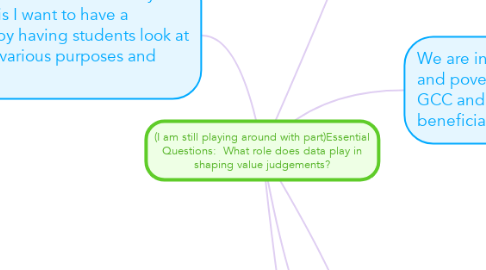(I am still playing around with part)Essential Questions: What role does data play in shaping value judgements?
por First Last


1. 1st/2nd Lesson: Introductory My rationale for starting with something personal was I thought that this would be a good entry point to hook and catch interest prior to launching into the research. If I start with how value judgements are made of them, then this will help support them in the questioning of their own biases, assumptions, and preconceptions. Additionally, I want students to evaluate how poverty is defined based on multiple perspectives and how important lens are when thinking about social issues like poverty.
1.1. Define poverty
1.2. How does your definition compare: Chinese Proverb: A book holds a house of gold. To be without a friend is to be poor indeed. ~ Tanzanian proverb Loneliness &...feeling...unwanted is the most terrible poverty.~Mother Theresa
1.3. Quote Dissection:"Tell me your measure of who is poor and I will tell you what your values are"
1.3.1. If we could only rely solely on the definition you provided, then what could we assume you value?
1.4. Students will explore definitions of poverty from various points of view. Sociological; Psychological; Economic; Historical; Cultural
1.4.1. Group graphic organizer that has all the definitions on it.
1.5. https://www.youtube.com/watch?v=mVTcQKKcY9s
2. 3rd/4th Lesson: Quantitative Research: I really do not like the math unit in my Theory of Knowledge class and my thinking behind this is I want to have a stronger unit, but not so "mathy". I can accomplish this by having students look at how data is perceived and manipulated to suit people's various purposes and how quantitative data does not tell the whole story.
2.1. PPI: What kind of value judgments could you make about the people of this country based on the PPI?
2.2. MPI: What kind of value judgments could you make about the people of this country based on the MPI?
2.3. Compare and Contrast the indices, and your values judgments. Which is more favorable? Why? Which index is more valuable to you as a the group conducting the research?
2.4. What are the strengths and weaknesses of the PPI and the MPI? Students will identify, read, and annotate the articles. What implications do these strengths and weaknesses of these indices have on the country of choice to research?
3. 5th/6th Lesson: Qualitative Research : The idea here was to balance the quantitative data with qualitative data. How are the pictures the same and/or different? Should we rely on just one type of data or both? How does this shape how we think?
3.1. Continue with research on chosen country
3.2. Identify anecdotal stories and articles about the country of research in order to infer values.
3.3. Compare and contrast the values inferred from the PPI and MPI with the values inferred from the anecdotal evidence.
3.4. How is data both a help and a hindrance in reference to your chosen country to research?
4. Objectives
4.1. I can commit to the process of continuous learning and reflection; I can select and apply appropriate tools and strategies to communicate and collaborate effectively.
4.1.1. I can share knowledge and encourage discourse
4.1.2. I can investigate the world by framing questions, analyzing and synthesizing relevant evidence, and drawing reasonable conclusions that lead to further enquiry.
4.1.3. I can understand that world events and global issues are complex and interdependent.
5. 7th/8th Lesson: Product: It does not have to be an infographic, but I would like students to develop a product that IB Visual Arts students can critique and provide feedback.
5.1. What makes a good TED Talk?
5.2. Evaluate sample TED talks
5.3. Draft TED talk to capture learning & reflections
5.3.1. Have TED talks evaluated by Speech students
5.3.2. Students will revise TED talks and delivery them to an audience.

